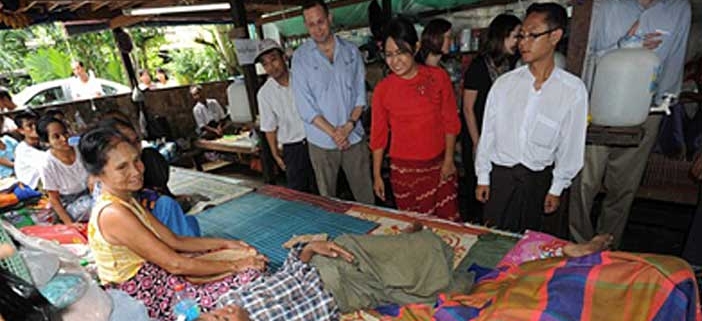HIV, TB Treatment Urgently Needed in Burma: MSF
WEDNESDAY, 22 FEBRUARY 2012
One of the world’s major humanitarian organizations, Médecins Sans Frontières (MSF), says there is a critical need for increased HIV/AIDS and tuberculosis (TB) treatment in Burma.
MSF, which is the largest provider of HIV/AIDS treatment in Burma, on Tuesday released a report titled, “Lives in the Balance,” highlighting the devastating effect that the cancellation of an entire round of funding from the Global Fund to fight HIV/AIDS, TB and malaria will have on the country.
Peter Paul de Groote, the head of mission at MSF Burma, said in the report: “Yet again, donors have turned their backs on people living with HIV and TB in Myanmar. Everyday we at MSF are confronted with the tragic consequences of these decisions: desperately sick people and unnecessary deaths.”
The MSF report said that some 85,000 people in Burma are in urgent need of lifesaving anti-retroviral therapy (ART) and are unable to access it. Of an estimated 9,300 people newly infected over the past year with Multi-Drug Resistant Tuberculosis (MDR-TB), to date just over 300 have been receiving treatment.
“Without increased availability of treatment, HIV and TB will continue to spread unchecked in many areas. The time to treat is now,” said Khin Nyein Chan, a Burmese doctor who works with the MSF.
“There is a real opportunity here; HIV prevalence rates in Myanmar are relatively low. It is lack of access to treatment that makes it one of the most serious epidemics in Asia,” said the doctor.
Between 15,000 and 20,000 people living with HIV/ AIDS die every year in Burma because of lack of access to ART, says the report.
TB prevalence in Burma is more than three times the global average. Burma is among the 27 countries with the highest MDR-TB rates in the world. MDR-TB has the same airborne transmission as non-resistant TB, but it is far more complex and lengthy to treat, said the report.
In September last year, MSF ended its medical activities in Thailand after 35 years in the country due to what it termed as interference by the Thai government, leaving thousands of undocumented Burmese migrant workers without access to free medical treatment.
According to Denis Penoy, the former head of MSF’s mission in Thailand, more than 55,000 people have been affected by the closure of MSF’s projects in Samut Sakhon Province near Bangkok, and Three Pagodas Pass on the Thai-Burmese border.
Burma, the least developed country in Southeast Asia, suffers from an underfunded state healthcare system and is one of the lowest recipients of Official Development Aid in the world, according to MSF.
But with political reform being reciprocated by greater engagement from the international community, there is a real opportunity to put access to treatment for people living with HIV and TB at the top of donor priority lists, said the report.
Photo : Getty Images



